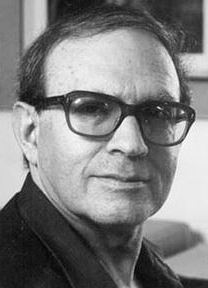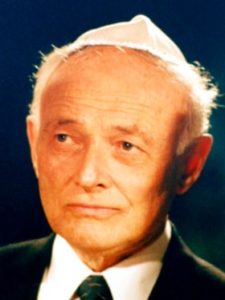Quantum Physicist and IDF Commander

Yuval Ne’eman
Yuval Ne’eman (1925-2006) was born in Tel-Aviv. His grandfather Aba Ne’eman had made aliyah to Yaffo from Lithuania as an eighteen year old, and was later among the first 66 families which settled and co-founded the city of Tel-Aviv. His grandfather also set up the city’s first electrical generator, and built some of its first factories. This may be what inspired Yuval to study mechanical engineering. He enrolled at Technion at age 15. At the same time, he joined the Haganah, and would fight valiantly in Israel’s Independence War, rising to the rank of commander of the Givati Brigade. Having spent several years living in Egypt with his parents as a child, Ne’eman spoke Arabic fluently and served as a liaison to Israel’s Mizrachi Jews, helping to settle them in the new country. In the mid-1950s, Ne’eman played a key role in the IDF’s operational command, developed its reverse mobilization system, and wrote Israel’s first defense doctrine. Meanwhile, he joined Israel’s Nuclear Energy Commission and oversaw the development of Israel’s nuclear capabilities. While serving as IDF attaché in London, he earned his PhD in physics. The following year he published his classification system for hadrons, laying the foundation for the quark model of quantum physics (proposed by recent Jews of the Week Murray Gell-Mann and George Zweig). Ne’eman returned to Israel in 1961 to direct the Soreq Nuclear Research Centre, one of the most important R&D facilities in Israel. He retired from the IDF with the rank of colonel, and founded Tel Aviv University’s School of Physics and Astronomy in 1965. Ne’eman directed it for the next seven years, then became president of he whole university. After this, he directed its Sackler Institute of Advanced Studies for nearly two decades. Ne’eman also co-directed the Center for Particle Theory at the University of Texas in Austin. A big believer in space exploration, he founded the Israel Space Agency in 1983 and chaired it until his death. He was chief scientist of Israel’s Defense Ministry in the 1970s, which opened the door for him to enter politics. Ne’eman founded the right-wing Tehiya party in response to Israel’s peace treaty with Egypt. He was elected to the Knesset in 1981 and became the country’s first Minister of Science and Technology. He continued to serve in the Knesset for over a decade. Among his many awards are the Israel Prize, the Wigner Medal, and the Albert Einstein Prize. He was also a member of the National Academy of Sciences. Ne’eman wrote a layman’s book on quantum physics called The Particle Hunters, which has been described as “the best guide to quantum physics at present available.”
Words of the Week
… Most of my people think as I do, but they’re afraid to say so… we suffer because of our Arab brothers, but we are also dependent on them. It’s a bizarre situation because the Arab countries don’t really care what happens to the Palestinian people. The only assistance that we have ever received from any country was from the ‘Zionist enemy.’
– Muhammad Zahrab, Palestinian Arab scholar

 Liviu Librescu (1930-2007) was born in Ploiesti, Romania. In November of 1940, the Romanian government allied with Nazi Germany, and Librescu’s family was deported to a labour camp. Eventually, they ended up in the Focsani Ghetto from which Librescu was liberated in 1945. He stayed in Romania and enrolled in aerospace engineering studies (inspired by his time watching birds fly in and out of the ghetto). A year after graduating he joined the Bucharest Institute of Applied Mechanics where he served as a researcher for 22 years. In 1969, Librescu earned his Ph.D in fluid dynamics, and wrote some very important papers that were unfortunately unknown in the West. He was also recruited by the government to work on top secret military projects. However, Librescu was soon fired for refusing to swear allegiance to the Romanian Communist Party and for requesting to emigrate to Israel. Thankfully, one of his groundbreaking research papers was smuggled out of Romania and brought him international attention. It reached the desk of Israeli Prime Minister Menachem Begin, who personally put pressure on the Romanian government to free Librescu. In 1978, the Romanians relented and Librescu made aliyah to the Holy Land. For the next seven years, Librescu taught at Tel-Aviv University and the world-famous Technion in Haifa. In 1985, he took a sabbatical year and visited Virginia Tech in the US. He decided to stay and joined their Department of Engineering Science and Mechanics. Librescu went on to become one of Virginia Tech’s most famous and beloved professors. He is credited with publishing more papers (250) than any other Virginia Tech professor, and among his many awards are a Dean’s Award for Excellence in Research and a Frank J. Maher Award for Excellence in Engineering Education. He was also on the editorial boards of seven scientific journals, and a guest editor of five more. On April 16, 2007, Librescu was teaching his regular class when a gunman walked into the engineering building at Virginia Tech and opened fire. When the gunman tried to enter Librescu’s classroom, the professor blocked the door and told his students to escape through the windows. He was fatally shot five times. All but one of his students were able to escape. The remaining 22 were saved by Librescu’s heroic actions. In a horrible twist of irony, the Virginia Tech shooting took place on the 27th of Nisan – Holocaust Memorial Day. President Băsescu of Romania posthumously awarded Librescu the Grand Cross of the Order of the Star of Romania (the country’s highest civilian honour), and renamed the street in front of the US Embassy in Bucharest after him. Virginia Tech’s Jewish Student Center is now named after him, too, as is a professorship at Columbia Law School. He was called the “Most Inspiring Person of 2007”. President George W. Bush eulogized Librescu with the following words: “With the gunman set to enter his class, this brave professor blocked the door with his body while his students fled to safety. On the Day of Remembrance, this Holocaust survivor gave his own life so that others may live.”
Liviu Librescu (1930-2007) was born in Ploiesti, Romania. In November of 1940, the Romanian government allied with Nazi Germany, and Librescu’s family was deported to a labour camp. Eventually, they ended up in the Focsani Ghetto from which Librescu was liberated in 1945. He stayed in Romania and enrolled in aerospace engineering studies (inspired by his time watching birds fly in and out of the ghetto). A year after graduating he joined the Bucharest Institute of Applied Mechanics where he served as a researcher for 22 years. In 1969, Librescu earned his Ph.D in fluid dynamics, and wrote some very important papers that were unfortunately unknown in the West. He was also recruited by the government to work on top secret military projects. However, Librescu was soon fired for refusing to swear allegiance to the Romanian Communist Party and for requesting to emigrate to Israel. Thankfully, one of his groundbreaking research papers was smuggled out of Romania and brought him international attention. It reached the desk of Israeli Prime Minister Menachem Begin, who personally put pressure on the Romanian government to free Librescu. In 1978, the Romanians relented and Librescu made aliyah to the Holy Land. For the next seven years, Librescu taught at Tel-Aviv University and the world-famous Technion in Haifa. In 1985, he took a sabbatical year and visited Virginia Tech in the US. He decided to stay and joined their Department of Engineering Science and Mechanics. Librescu went on to become one of Virginia Tech’s most famous and beloved professors. He is credited with publishing more papers (250) than any other Virginia Tech professor, and among his many awards are a Dean’s Award for Excellence in Research and a Frank J. Maher Award for Excellence in Engineering Education. He was also on the editorial boards of seven scientific journals, and a guest editor of five more. On April 16, 2007, Librescu was teaching his regular class when a gunman walked into the engineering building at Virginia Tech and opened fire. When the gunman tried to enter Librescu’s classroom, the professor blocked the door and told his students to escape through the windows. He was fatally shot five times. All but one of his students were able to escape. The remaining 22 were saved by Librescu’s heroic actions. In a horrible twist of irony, the Virginia Tech shooting took place on the 27th of Nisan – Holocaust Memorial Day. President Băsescu of Romania posthumously awarded Librescu the Grand Cross of the Order of the Star of Romania (the country’s highest civilian honour), and renamed the street in front of the US Embassy in Bucharest after him. Virginia Tech’s Jewish Student Center is now named after him, too, as is a professorship at Columbia Law School. He was called the “Most Inspiring Person of 2007”. President George W. Bush eulogized Librescu with the following words: “With the gunman set to enter his class, this brave professor blocked the door with his body while his students fled to safety. On the Day of Remembrance, this Holocaust survivor gave his own life so that others may live.”